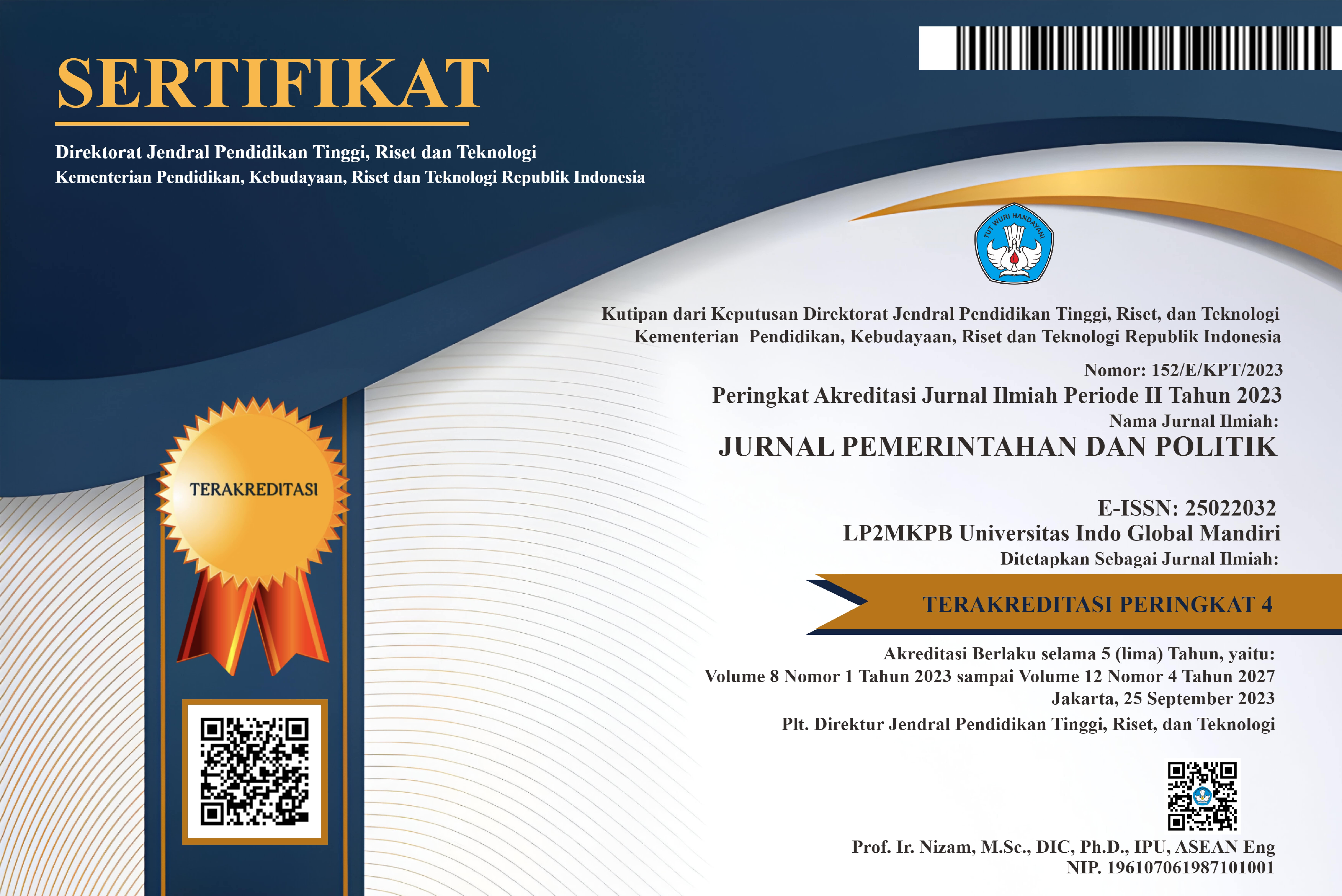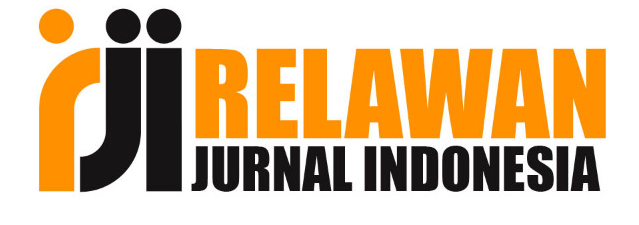IMPLEMENTASI PROGRAM PENGEMBANGAN INDUSTRI KECIL MENENGAH (IKM) OLEH DINAS PERINDUSTRIAN KABUPATEN BEKASI
DOI:
https://doi.org/10.36982/jpg.v7i3.2317Abstract
Small and medium industries or commonly called IKMs are one of the main pillars for the government to create new jobs and ideas and creativity to produce goods with selling value. SMEs are also an important part of the economy for developing countries including Indonesia. Small and Medium Industry (IKM) is one of the industrial sectors that can be used as a foundation to create an entrepreneurial climate that can absorb labor. Small industry has a strategic position, potential and role in achieving national development goals. The method used in this research is descriptive with a qualitative approach. The data collection techniques that the researchers used were interviews, observation and documentation. Actions in data analysis are data reduction, data presentation, conclusion drawing and verification as well as using Charles O. Jones' theory of policy implementation which includes Organization, Interpretation, and Application. The results of this study can be seen that the implementation of the Small and Medium Industry Development Program (IKM) by the Bekasi Regency Industry Office has been going quite well. However, based on research in the field, there are still problems that need to be addressed in order to increase the development of SMEs in realizing national development goals.
Keywords: Development, Economics, Industry
References
Buku:
Agustino, Leo. 2008. Dasar-Dasar Kebijakan Publik.
Bandung: Alfabeta
Anggoro, M. Toha, dkk. 2010. Metode Penelitian.
Jakarta: Universitas Terbuka
Creswell, John W. 2014. Research Design, Pendekatan
Metode Kualitatif, Kuantitatif, dan Campuran.
Yogyakarta: Pustaka Belajar.
Dunn, William N. 2003. Analisis Kebijakan Publik.
Yogyakarta: Gajah Mada University Press.
Syafiie, Inu Kencana. 2006. Ilmu Administrasi Publik. ,
Jakarta: PT. Rineka Cipta.
Koontz, Harold dan Cyril O’Donnel. 1996. Manajemen;
Jilid 1 Edisi Kedelapan. Jakarta: Erlangga.
Kadji, Yulianto. 2015. Formulasi dan Implementasi
Kebijakan Publik Kepemimpinan dan Perilaku
Birokrasi dalam Fakta Realitas. Gorontalo; UNG
Press Gorontalo.
Mustopadidjaja, Dr. 1992. Studi Kebijaksanaan. Jakarta;
Fakultas Ekonomi Universitas Indonesia
Moleong, Lexy J. 2011. Metodologi Penelitian Kualitatif.
Bandung PT Remaja Rosdakarya
Sugiyono, 2012. Metode Penelitian Kuantitatif Kualitatif
dan R&D. Bandung: Alfabeta
Winarno, Budi. 2002. Teori dan Proses Kebijakan Publik.
Yogyakarta: Media Pressindo.
Niskha Sandriana, Abdul Hakim, Choirul Saleh. 2015.
Strategi Pengembangan Produk Unggulan Daerah
Berbasis Klaster Di Kota Malang. Program Magister
Administrasi Publik, Universitas Brawijaya. Vol. 5,
No. 1.,
Lestari, E. P. 2010. Penguatan Ekonomi Industri Kecil
Dan Menengah Melalui Platform Klaster Industri.
Universitas Terbuka.
Lestari, E. P. 2014.Pengembangan komoditas Unggulan
UMKM Di Kabupaten Nabire Papua. Universitas
Terbuka.
Ridwan, M., & Hatuwe, M. 2017. Pembinaan Industri
Kecil dan Menengah Pada Dinas Perindustrian,
Perdagangan, Koperasi dan UMKM Kota Bontang.
Jurnal Administrative Reform.
Haedar Akib, 2010. Implementasi Kebijakan: Apa,
Mengapa, dan Bagaimana. Jurnal Administrasi
Publik. Universitas Negeri Makassar. Volume 1 No. 1
Nurhayati, Siti. 2012. Peran Dinas Perindustrian dan
Perdagangan dalam Pengembangan Industri Kecil
Menengah di Kota Surakarta. Skripsi. Fakultas Ilmu
Sosial dan Politik, Universitas Sebelas Maret,
Surakarta.
Undang-Undang:
Menurut UU No. 3 tahun 2014 tentang Perindustrian,
Sentra Industri Kecil dan Industri Menengah.
Peraturan Daerah Nomor 6 tahun 2016 tentang
Pembentukan dan Susunan Perangkat Daerah
Kabupaten Bekasi.
Peraturan Bupati Nomor 77 tahun 2016 tentang
Kedudukan, Sususnan Organisasi, Tugas dan Fungsi
Serta Tata Kerja Dinas Perindustrian Kabupaten
Bekasi.
Peraturan Daerah (Perda) Kabupaten Bekasi Nomor 7
tahun 2017 tentang Rencana Pembangunan Jangka
Menengah Daerah (RPJMD) Kabupaten Bekasi tahun
-2022.
Surat Keputusan Menteri Perindustrian dan Perdagangan
NO 590/MPP/KEP/10/1999.











